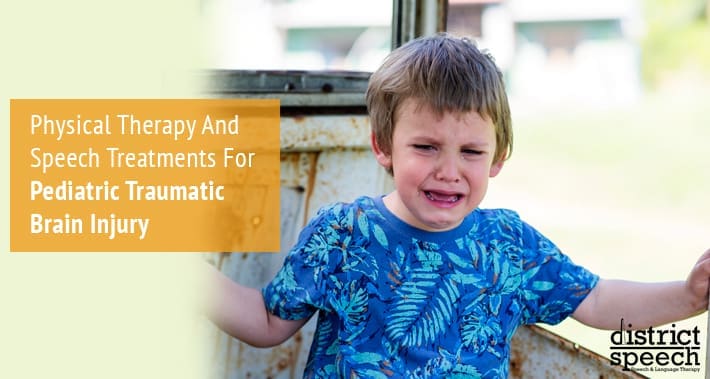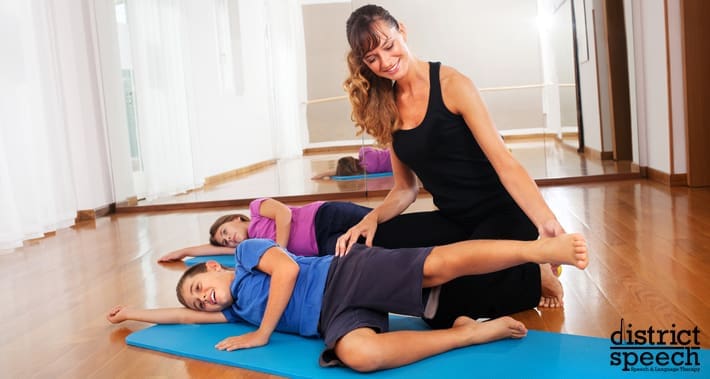
As a parent, you have a lot to worry about when it comes to your children.
Physical development and speech are both factors that you may look to in order to determine if your child is developing at a rate appropriate to their age.
One factor which can impede a child’s development is a pediatric traumatic brain injury.
If you have the unfortunate experience of having a child who has suffered a traumatic brain injury, know there is help.
At District Speech and Language Therapy, our team of professionals can help create a treatment plan to address issues that can arise with a brain injury.
Keep reading to learn more about brain injuries and how speech therapy and physical therapy can help in your child’s recovery.
What Is Traumatic Brain Injury?
Physical trauma occurs when excessive force is exerted on the body, resulting in serious injury.
Traumatic brain injury refers specifically to injury which occurs to brain tissue.
Falls, blows to the head, and car accidents are all common causes of traumatic brain injury.
Sometimes, traumatic brain injury can cause brain damage to only the right hemisphere of your brain.
This depends on the nature of the injury.
If the cause of an injury results in a wound that breaks or punctures the skin, this is known as a penetrating injury.
Injuries where there is damage, but no break to the skin are called closed injuries.
Recent studies reviewed the statistics for traumatic brain injuries in children under 14 and found that 90% of all traumatic brain injury patients returned home with mild injuries.
The rest are either hospitalized or fatal, which is why traumatic brain injury is the leading cause of death and disability in children.
How Do Infants Get Traumatic Brain Injury?
Traumatic brain injury can occur during childbirth or due to birth related injuries.
This can be due to external physical force or pressure on the head.
Birth injuries can also occur if the baby’s head gets stuck in the birth canal, or if an instrument, such as forceps, used during birth is applied with too much pressure.
Traumatic brain injury is more common in premature babies – as a result, physical therapy for premature babies often covers traumatic brain injury.
Other causes of traumatic brain injury for infants includes falling, followed closely by motor vehicle collisions and pedestrian or bicycle accidents.
In fact, traumatic brain injury resulting from motor vehicle accidents is so common that we have developed speech therapy specifically for recovering from a car accident.
Signs Of Traumatic Brain Injury In Young Children
Signs and symptoms of traumatic brain injury in infants are not always easy to recognize.
Physical signs may include:
- Abnormal eye movement
- Distorted facial features
- Neck stiffness
- Large forehead
- Spinal malformation
- Small skull/head
- Trouble moving the arms, legs, head, and body
RELATED: Understanding Gross Motor Skills
Other symptoms can include:
- Trouble sleeping
- Irritability
- Excessive crying
- Problems eating
- Muscle spasms
- High sensitivity to pain
- Disorientation
- Vision problems
- Hearing issues
Infants with brain damage may also be slower to meet developmental milestones such as sitting up, crawling, and walking.
Over time, without extra help, this could also lead to learning disabilities and reading impairments as they grow.
You may notice that some of these symptoms have overlap with other neurological conditions, like Down syndrome and autism spectrum disorder.
That’s why it’s important to get a screening for autism and other issues if you suspect there’s a concern.
RELATED: Frequently Asked Questions About Down Syndrome.
RELATED: Frequently Asked Questions About Autism Spectrum Disorder.
How Is Pediatric Traumatic Brain Injury Diagnosed?
There are a wide range of symptoms which can point to traumatic brain injury.
Sometimes, the symptoms are so mild they may not lead to a diagnosis.
A doctor may look for signs such as an individual’s ability to respond to comments, speak, and open their eyes.
In cases where there are more evident signs something isn’t right, a doctor can use diagnostic tools such as MRIs or CT scans to determine if there is an injury.
They will use these scans to see where the brain damage is located, and if there is any fluid such as bleeding which could be adding to pressure on brain tissue.

How Can Pediatric Physical Therapy For Traumatic Brain Injury Help?
Traumatic brain injury often results in functional limitations.
The specific treatment plan a pediatric physical therapist can offer will vary greatly, depending on the severity of the injury.
Your pediatric physical therapist can work with your baby to improve:
- Coordination and balance
- Functional movement
- Maintaining alertness
- Flexibility
- Sitting up, and eventually standing without support (where age appropriate)
- Increasing strength
How Can Speech Therapy For Kids With Traumatic Brain Injury Help?
Traumatic brain injury can result in delay or loss of language ability in children.
This is because your brain plays a central role in controlling your speaking ability.
As a result, there are many different speech disorders that are associated with traumatic brain injuries.
Difficulty forming speech, trouble with finding the right word, incoherent speech, and inability to engage in conversation are a few of the ways this may manifest.
Your child’s speech therapist can work with both you and your child to provide treatment for speech related deficiencies and issues.
Some of the areas in which they may play a role include:
- Screening for difficulties related to speech, language, and communication
- Developing treatment plans designed to maintain speech and language abilities
- Education aimed at preventing complications
- Offering training on the use of alternative communication (AAC) methods
- Working in conjunction with other professionals to develop treatment programs
- Advocacy, especially in situations where issues with communication can be mistaken for problems related to motivation or attitude, particularly in school settings
Book Your Appointment With District Speech Today
Has your child experienced a traumatic brain injury?
Are they struggling to recover, having difficulties with motor skills, or communication?
Speech therapy can help your child recover from a traumatic brain injury no matter how old they are.
If you are looking for extra support to help with their recovery, book your appointment with District Speech today.
We are professional speech therapists in Washington DC, and we can help create a treatment plan to help in your child’s recovery.
We also offer the option of having speech therapy from the comfort of your home, also known as speech teletherapy.
Book your appointment with District Speech today.
1300 I St NW, Suite 400 E,
Washington, DC 20005
- https://g.page/districtspeech
District Speech and Language Therapy specializes in speech therapy, physical therapy, and occupational therapy solutions, for both children and adults, in the Washington D.C and the Arlington Virginia areas.